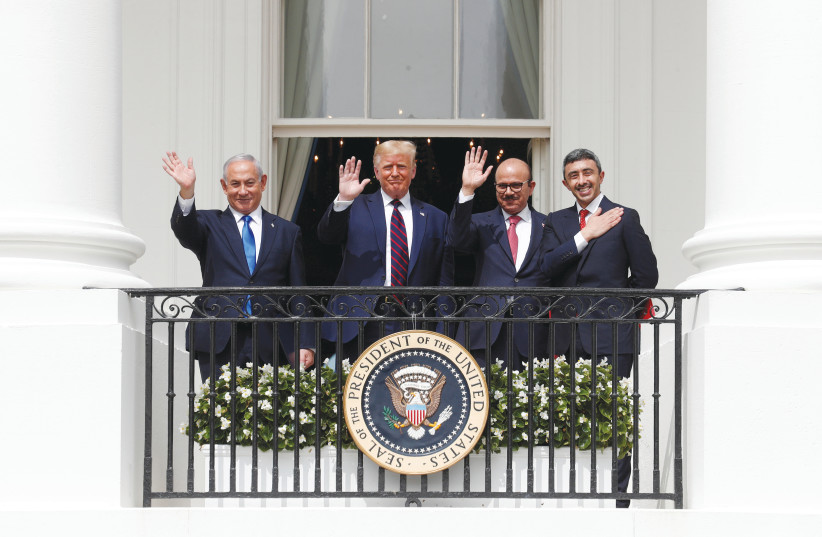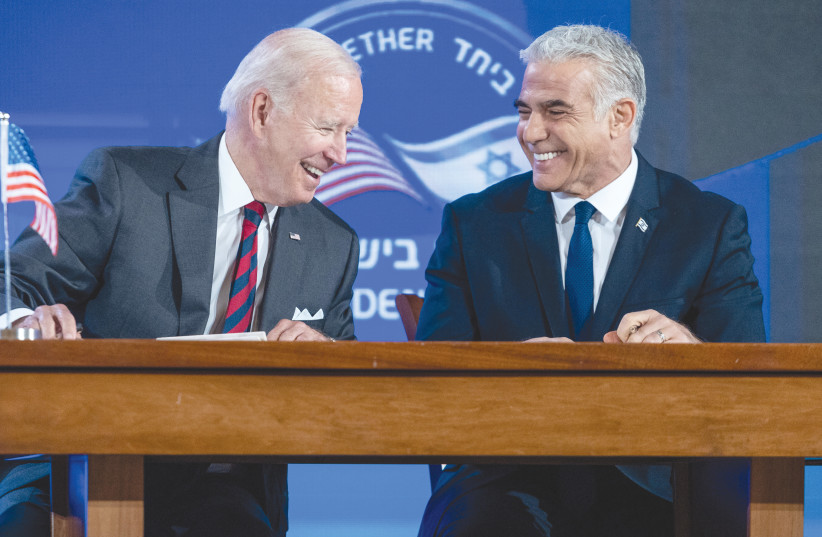by Herb Keinon
Israel has been dependent on the European Union for markets in the past, and now the EU needs Israel's help.
 |
THEN-US PRESIDENT Donald Trump hosts the leaders of Israel,
Bahrain and the UAE for the Abraham Accords signing ceremony at the
White House, 2020. President Joe Biden should put his personal stamp on
the accords, says the author.
(photo credit: TOM BRENNER/REUTERS)
|
The Abraham Accords are here to stay.
That was one of the key messages US President Joe Biden relayed during his brief Mideast tour last week. Even though the accords were brokered by his hated predecessor Donald Trump, Biden praised the landmark agreements during his visit and talked of the hope and the need to expand them.
Why is that so important? Because it signals to everyone that those accords are permanent, not some whim of a mercurial president agreed upon by the Arab countries just to please him. The accords have an inner logic and now a momentum all their own that transcends whoever happens to be sitting in the White House at a given moment.
Republican administration or Democratic one, the Abraham Accords are now a Mideast fixture and one that Biden blessed. This is something that has far-reaching significance.
For example, EU foreign policy chief Josep Borrell’s announcement on Monday of the restarting of the EU-Israel Association Council dialogue, disbanded a decade ago over policy disagreements, cannot be divorced from the Abraham Accords.

Why not? Because what the Abraham Accords did was remove the link between the United Arab Emirates, Bahrain, and Morocco's relationship with Israel and progress on the Israel-Palestinian track.
If until the signing of those accords those countries' ties with Israel were held hostage by the Palestinians — if the Palestinians agree to terms with Israel, those countries could move forward with ties with the Jewish state; and if not, they could not -- once the accords were signed, that paradigm shifted.
Yes, Morocco, Bahrain, and the UAE would continue supporting the Palestinians' position, but doing so would not preclude ties with Israel. They could maintain strong ties with Israel on the one hand, and strong ties with the Palestinians on the other. The two issues were decoupled.
This is an approach Indian Prime Minister Narendra Modi instituted when he came to power in 2014. The Indians called this de-hyphenation. What that meant was simple: India’s relationship with Israel would stand on its own merits, independent and separate from India’s relationship with the Palestinians. It would no longer be India's relationship with Israel-Palestine, but India’s relationship with Israel, and India’s relationship with the Palestinians. No hyphen.
Israel's Relationship With the EU
While the Indians were de-hyphenating the relationship in 2014, the EU — during the first half of the last decade — was busy emphasizing that hyphen. Under former foreign policy czars Catherine Ashton and Frederica Mogherini, the EU linked increased cooperation with Israel on Jerusalem doing what the EU thought it must regarding the Palestinians and settlement construction.
That condescending attitude elicited a fierce reaction from the various Netanyahu governments, especially when Avigdor Liberman served as foreign minister from 2009-2012, and 2013-2015. Both he and then-prime minister, Benjamin Netanyahu, pushed back against the EU's dictates, leading the EU to respond. Both sides did the opposite of what US president Teddy Roosevelt once advised: they both brandished various sticks, but rather than speaking softly, they both spoke loudly.
The EU turned into a veritable copywriter of anti-Israel condemnations for everything from building in a east Jerusalem neighborhood to responses to attacks from Gaza, and Israeli officials dismissed the EU as “irrelevant,” and treated it as such.
The EU-Israel Association was established in 1995 to enhance cooperation between the two sides, and each year an Association meeting was to be held to discuss issues of mutual interest. In 2013, Israel canceled the planned meeting to protest the EU decision to differentiate in all agreements with Israel between areas within the Green Line and the settlements, and then the following year the meeting was canceled at the behest of some EU states protesting Operation Protective Edge in Gaza.
No Association meeting has been held since.
Things started to change — the volume began to be turned down — when Borrell took over from Mogherini in December 2019, and when Gabi Ashkenazi became Israel's foreign minister in May 2020. When Yair Lapid became foreign minister in 2021, he further put improving ties with the Europeans high on the agenda.
“The situation with the countries of the EU is not good,” Lapid lamented during his maiden speech as foreign minister in June 2021. “The ties with many of the governments were abandoned and turned hostile. To shout ‘antisemite’ is not a policy, even if sometimes it feels right.”
Lapid spent much of his time as a foreign minister trying to improve ties with Europe. Europe, in kind, toned down its hectoring of Israel.
“The fact that 27 EU foreign ministers voted unanimously in favor of strengthening the economic and diplomatic ties with Israel is proof of Israel's diplomatic power and the government's ability to create new opportunities in the international community.”
Prime Minister Lapid
“The fact that 27 EU foreign ministers voted unanimously in favor of strengthening the economic and diplomatic ties with Israel is proof of Israel's diplomatic power and the government's ability to create new opportunities in the international community.” Prime Minister Lapid said Monday, welcoming the EU decision to revive the high-level Association meeting.
While true, Lapid left out one ingredient that is also contributing to improved ties. With the fighting raging on in Ukraine and no end in sight, and with a cold winter just a few months away, the EU needs to diversify its gas supplies — and one potential source is Israel.
If in the past Israel was highly dependent on the EU for markets, now the EU needs Israel for something as well: gas. This was evident during the visit of EU commissioner European Commission President Ursula von der Leyen in June when energy was a major point of discussion.
“The Kremlin's behavior only strengthens our resolve to break free of our dependence on Russian fossil fuels,” she said in one speech. “For instance, we are exploring ways to step up our energy cooperation with Israel.”
Israel is not in a position to deliver large quantities of gas to Europe in the immediate future, neither via an underwater pipeline nor through Egypt. But the discovery of gas off the coast has made Israel look to some Europeans less like the wayward schoolboy they feel free to discipline and scold, and more like the attractive maiden, it is well worth courting.
A resumption of the EU-Israel Association council is one way to do that, even if — at that first meeting of that council — differences will be aired over the Palestinian issue. This time, however, those differences will not place a brake on the relationship. Because if some Arab countries can move forward at great speed with Israel — despite the lack of movement on the Palestinians issue — then why can’t the EU? Does the EU, in this matter, really need to be more Catholic than the pope?
Herb Keinon
Source: https://www.jpost.com/israel-news/article-712553
No comments:
Post a Comment